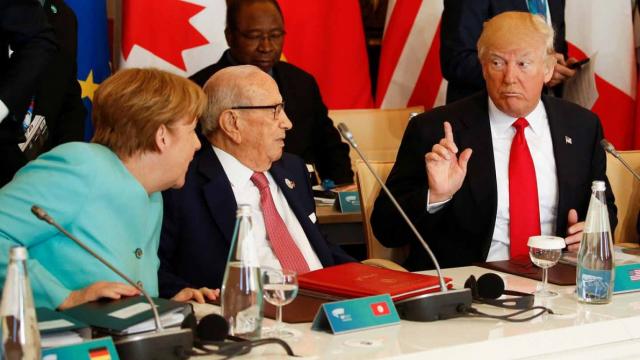
BERLIN – From trade to defense and every policy in between, Germany appears to be President Donald Trump's favorite frenemy of late. It's a startling development for Germany, the poster child of the social and economic order that the United States established after World War II.
Now, just a year and a half into the Trump presidency, anti-Americanism is on the rise here and German-American interests are quickly diverging, said analysts. Guiding Europe's economic engine and its ideological compass, longtime Chancellor Angela Merkel and other German leaders must walk a fine line to preserve a rapidly changing transatlantic relationship, they added.
"There's still an undercurrent of security and economic relations that will prevail," said Henning Riecke, head of the USA/Transatlantic Relations Program at the German Council on Foreign Relations in Berlin. But, "this is certainly a changed transatlantic relationship."
Germans are puzzled by the sharp turn in their relationship with the United States. The past few months having been particularly contentious. In June, President Trump tweeted out a raft of falsehoods about rising crime rates in Germany, placing blame on Merkel's 2015 decision to provide almost 1 million refugees safe haven in Germany.
The following month, at the NATO summit in Brussels, normally a quiet event between committed allies, the American president lambasted Germany over its anemic defense spending, its unbalanced trade relationship with the U.S. and its controversial energy dealings with Russia – even going so far as to call Germany Russia's "captive."
"There's a German feeling that Trump is singling out Germany because he perceives that Germany is his prime opponent in the West," said Gustav Gressel, a senior policy fellow at the European Council on Foreign Relations. "We really don't know what to do about it except to be patient."
But patience can only go so far in a country where citizens feel scorned by a longtime benefactor and close ally. Germans used to cherish their special relationship with the United States. Americans helped end both communism and fascism in the country in the 20th century.
Yet Trump's constant vilification has crossed a line.
According to a 2017 Pew Research Center study, 56 percent of Germans thought U.S.-German relations were bad and only 11 percent expressed confidence in the New York real estate mogul and former reality television star – a nosedive in figures from the heyday of the Obama years, when 80 percent were confident in the American president.
The poll led to calls for the normally stoic Chancellor Merkel to confront Trump in order to preserve the Western order.
"Merkel needs to act with more strength against Trump," said Jörg Dobers, 49, a pharmaceutical representative in Berlin. "She has no other choice – she just has to do it. We need to make Trump much more conscious of his actions."
While Merkel has heeded the call in some respect, calling on Europe to "take its destiny into its hands" and pushing against American disapproval to foster economic relations with both Iran and Russia, Germany might not be able to break with its longtime ally.
For all its economic might, German success remains deeply intertwined with that of the United States, especially when it comes to trade and security. America remains the largest market for German exports, and Germany's anemic spending on defense makes it no match to any foreign aggressor looking for a fight.
Ultimately, Germany must tread lightly on remolding the transatlantic relationship. That means heeding Trumps calls to boost defense spending, while at the same time working toward integrating more countries into the rules-based Western order despite President Trump's work to do the opposite, said Riecke.
"Whenever politicians say that we need to take our fate into our own hands, that doesn't mean we need to break with America," he said.
Doing so would signal that "Germany is ready to pick up the task" of dealing with 21st century problems facing the globe – like Russian aggression, climate change, migration issues and the rise of right-wing extremism – without giving into "the furor of anti-American rhetoric," said Gressel.
"It would give the German electorate a bit more reassurance that in spite of the difficult times and the Trump situation, that Germany is ripe and ready," he said. "Trump is unpredictable, but any Trump successor would rather deal with a Germany that can do more on its own, than with a Germany that's still passively waiting on what Washington does."














